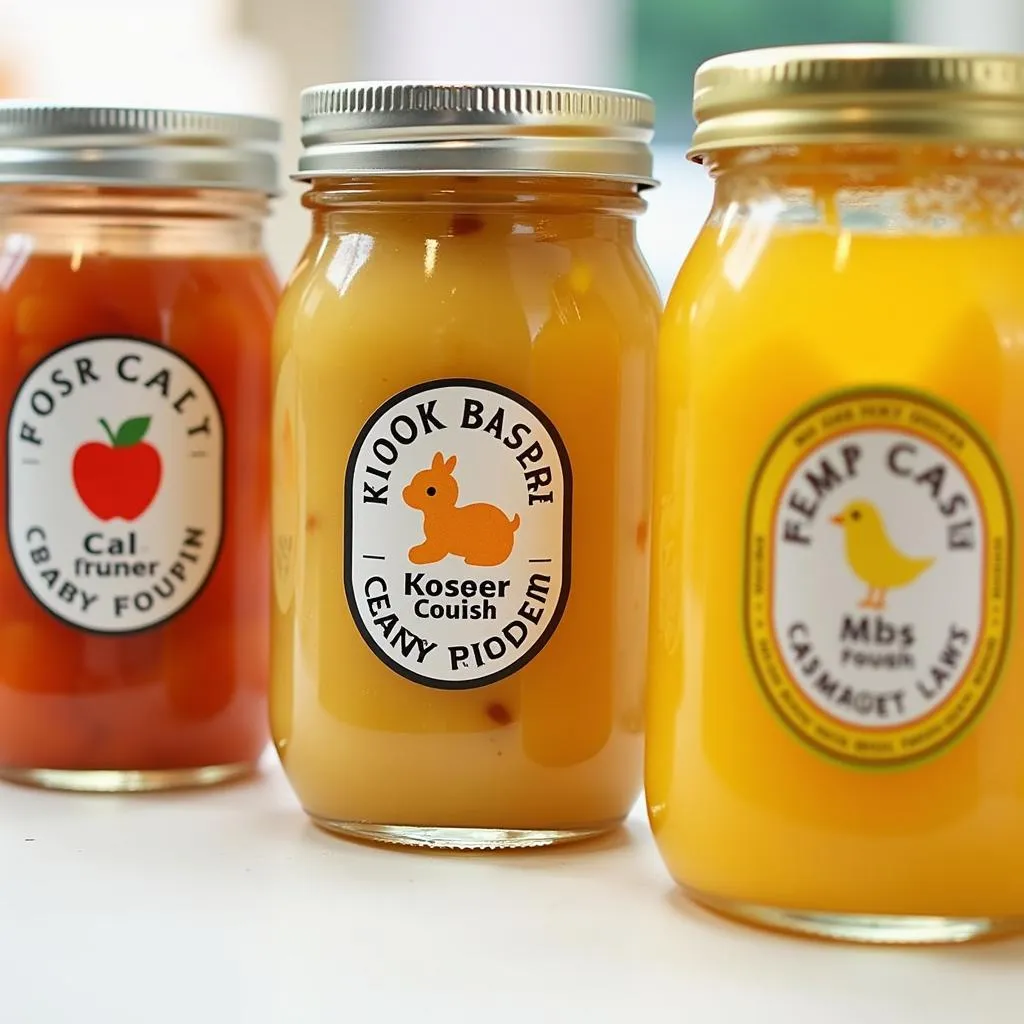Choosing the right food for your little one is a significant step in their development, and when you’re committed to a kosher lifestyle, that decision involves an extra layer of consideration. Kosher Baby Food adheres to the dietary laws of Kashrut, ensuring it meets specific guidelines for ingredients, processing, and more. Whether you’re just starting your baby on solids or looking for more variety, this comprehensive guide explores everything you need to know about kosher baby food, from understanding the basics to making informed choices for your little gourmand.
Deciphering the Basics: What Makes Baby Food Kosher?
Kosher dietary guidelines, stemming from Jewish tradition, encompass a set of rules determining which foods are considered “fit” for consumption. While seemingly complex, the core principles are straightforward, especially when applied to baby food. Primarily, kosher baby food must be free from:
- Non-kosher animals: This includes pork and shellfish, along with any derivatives like gelatin from non-kosher sources.
- Mixing meat and dairy: A fundamental principle of Kashrut is the separation of meat and dairy. This applies to ingredients, processing, and even cookware.
- Certain grains during Passover: Specific grains like wheat, rye, barley, oats, and spelt undergo strict restrictions during Passover.
 Kosher Symbols on Baby Food Jars
Kosher Symbols on Baby Food Jars
Ensuring Authenticity: The Role of Kosher Certification
Recognizing kosher baby food goes beyond scrutinizing ingredient lists. A trusted kosher certification symbol on the packaging provides the assurance you need. These symbols, often referred to as “hechshers,” are provided by recognized kosher certifying agencies. They verify that the food production process, from ingredients to packaging, adheres to kosher standards.
Navigating the Aisles: Types of Kosher Baby Food
Supermarket shelves are teeming with kosher baby food options, catering to different stages and tastes. Here’s a glimpse at the variety available:
- Single-ingredient purees: Perfect for starting solids, these are typically fruits, vegetables, or meats, offering simple flavors and easy digestion.
- Multi-ingredient blends: As your baby’s palate matures, these offer exciting flavor combinations and introduce different food groups.
- Pouches and jars: Convenience is key for busy parents. Pouches and jars provide pre-portioned servings ideal for on-the-go feeding.
- Dry cereals and snacks: Designed for older babies exploring finger foods, these options provide essential nutrients and encourage self-feeding.
 Parents Choosing Kosher Baby Food in Supermarket
Parents Choosing Kosher Baby Food in Supermarket
Homemade Goodness: Making Your Own Kosher Baby Food
For those who prefer a hands-on approach, making kosher baby food at home offers ultimate control over ingredients and freshness.
Here’s what you need to consider:
- Source kosher ingredients: Choose fresh produce, meat, and grains from trusted sources, ensuring they carry the kosher symbol.
- Maintain separate utensils: Dedicate separate utensils, cutting boards, and cooking equipment for meat, dairy, and pareve (foods that are neither meat nor dairy) preparations.
- Steam or bake: Opt for healthier cooking methods like steaming or baking, which retain nutrients and flavors.
- Puree or mash: Blend or mash the cooked food to a smooth consistency appropriate for your baby’s age and developmental stage.
Beyond the Basics: Additional Tips for Kosher Baby Food
- Read labels carefully: While a kosher symbol is essential, always review ingredient lists to confirm the absence of potential allergens or ingredients your baby may not be ready for.
- Introduce new foods gradually: Follow the four-day rule, introducing one new food at a time to monitor for any potential allergies or sensitivities.
- Consult a pediatric nutritionist: For personalized guidance on creating a balanced and nutritious kosher meal plan for your baby, consider seeking advice from a qualified professional.
 Mother Feeding Kosher Baby Food to Smiling Baby
Mother Feeding Kosher Baby Food to Smiling Baby
Conclusion: Nourishing Your Little One with Confidence
Choosing kosher baby food allows you to nourish your little one in accordance with your values and traditions. By understanding the principles of Kashrut and selecting reputable brands or making your own baby food at home, you can confidently provide your baby with delicious and nutritious meals that align with your family’s lifestyle.
FAQs about Kosher Baby Food:
- Are all baby food brands kosher? No, not all baby food brands are kosher. Always look for a reliable kosher certification symbol on the packaging.
- Is kosher baby food more expensive? The price of kosher baby food can vary depending on the brand and ingredients. However, there are affordable options available.
- Can I find kosher baby food in regular supermarkets? Yes, many supermarkets carry kosher baby food options. Check the designated kosher sections or inquire with store staff.
- What if I can’t find a specific kosher baby food flavor? You can always explore making your own baby food at home using fresh, kosher ingredients.
- Are there kosher baby food options for babies with allergies? Yes, several brands offer kosher baby food formulated for babies with common allergies, such as dairy, soy, or gluten.
Need further assistance with your kosher baby food journey? Reach out to our dedicated customer support team at Phone Number: 02437655121, Email: minacones@gmail.com. Or visit us at 3PGH+8R9, ĐT70A, thôn Trung, Bắc Từ Liêm, Hà Nội, Việt Nam. We are available 24/7 to help.
Discover more about nourishing your little one with our informative articles on [relevant topic] and [another relevant topic] on the Mina Cones Food website.